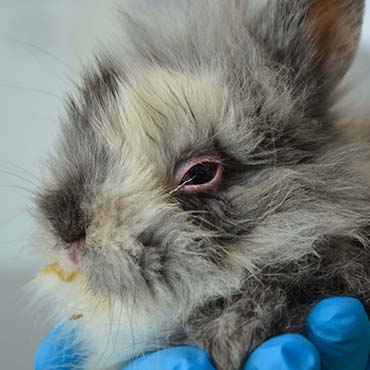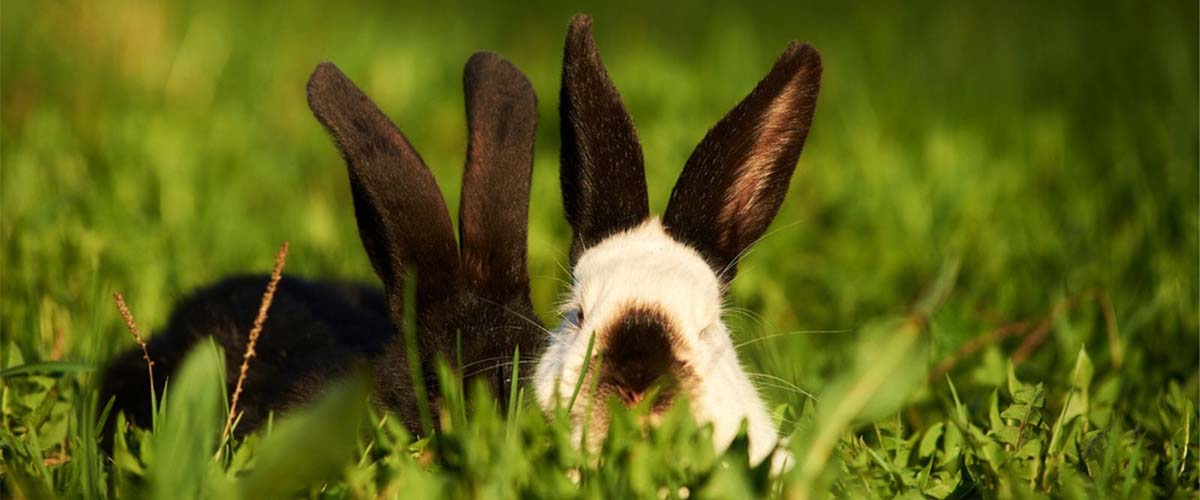Respiratory infections/snuffles in rabbits
Overview
- ‘Snuffles’ is the word we use to describe a respiratory (nose, throat or chest) infection in a rabbit.
- This article focuses on the two most common causes of snuffles in rabbits: ‘Pasteurella’ and ‘Bordetella’.
- Snuffles in a rabbit often causes sneezing, snotty eyes/nose, fast breathing, a reduced appetite and weight loss.
- Unfortunately, rabbits tend to hide symptoms of illness so are often very unwell by the time they show signs. Check your rabbit regularly for signs of illness and seek advice from your vet if you notice anything wrong.
- Respiratory infections in rabbits are often very serious and can even cause death if left untreated. Contact your vet immediately if your rabbit is struggling to breathe.
General information
Respiratory infections in rabbits (‘snuffles’) are common and are can be very serious. This is because rabbits are unable to breathe through their mouth if their nose is blocked and they tend to hide symptoms of being unwell, meaning illness is often serious by the time it’s noticed. Respiratory infections spread by direct contact between rabbits, on items such as food bowls, and through the air. Left untreated, a respiratory infection can cause very serious illness and even death. There are a number of germs that can cause snuffles in rabbits but ‘Pasteurella bacteria’ and ‘Bordetella bacteria’ are by far the most common.
- Pasteurella - Pasteurella is the most common cause of snuffles in rabbits. Pasteurella is a bacteria that naturally lives in the airways of most pet rabbits, but only tends to cause problems in times of stress, illness or if their home isn’t quite right (such as a hutch that’s not big enough, not well ventilated, or not cleaned out enough. In addition to the symptoms above, Pasteurella can also cause eye infections, dacryocystitis (swelling of the tear ducts), a head tilt and sometimes abscesses (around the head and in the brain).
- Bordetella - Bordetella is another type of bacteria that can cause snuffles in rabbits.

This rabbit has weepy eyes, a snotty nose and a scruffy coat due to snuffles, a respiratory infection
Symptoms
The symptoms of a respiratory infection include:
- Weepy eyes
- Discharge from the nose
- Sneezing/snuffles
- Fast breathing/difficulty breathing
- Wheezing/noisy breathing
- Low energy, being quieter than usual or hiding away
- Loss of appetite and weight loss
- Stained fur on front legs from cleaning weepy eyes and a runny nose
- Sudden death (unfortunately, rabbits tend to hide symptoms until they are very poorly)
When to contact your vet
Get in contact with your vet if you notice symptoms of snuffles in your rabbit. Left untreated, your rabbit is likely to become very poorly and could even die.
Emergency – contact your vet for an emergency appointment if your rabbit is struggling to breathe or breathing very heavily.
Treatment
Hospitalisation. If your rabbit is very unwell with a respiratory infection, it’s likely that they will need intensive care in a veterinary hospital until they start to improve and eat again.
- If your rabbit is struggling to breathe, treatment is likely to start with giving them oxygen, anti-inflammatories and antibiotics.
- Once their breathing is stable, they are likely to be given a fluid drip (or fluids under the skin if they can’t have a drip), and supportive treatments to help them breathe and keep their guts moving.
- Your rabbit may have other symptoms that need to be treated, for example, infected, swollen or blocked tear ducts that need to be flushed or abscesses that need to be drained or removed.
Home care. If your rabbit only has mild symptoms of snuffles, or if they are much better after being in hospital, they are likely to be sent home with medication such as antibiotics and other medications to help them feel better.
- It’s important that you give your rabbit all their prescribed medicines and let your vet know if you are struggling. You may find our medication timetable helpful.
- Your vet may also suggest using a nebuliser to soothe the airways and give certain medicines.
- You will need to monitor how much your rabbit is eating/pooing and tell your vet if you are concerned.
- You will need to correct any housing/hygiene problems your vet has discussed with you.
Outlook
The outlook for your rabbit depends how severe their symptoms are, and how well they fight the infection. Some rabbits recover in a few days and return to normal, other take weeks to improve, some recover but develop it again later in life and sadly, because of the seriousness of respiratory infections in rabbits, some don’t survive despite treatment.
Prevention
Reduce the chance of respiratory infections in your rabbits by:
- Keeping them stress-free and happy (in pairs/groups)
- Make sure they live in a spacious, clean, well-ventilated environment – it should be at least 10 x 6 x 3 ft in size (but bigger is better)
- Feed them a healthy diet (their body size in hay, an adult handful of green veg and if necessary, a tablespoon of pellets every day)
- Make sure fresh water is always available in a bowl and bottle.
Cost
Treatment for a poorly rabbit can become very expensive. It’s important to speak openly to your vet about your finances, the cost of treatment, as well as what you think is right for your rabbit. There are often several treatment options so if one doesn’t work for you and your pet then the vet may be able to offer another. Consider insuring your rabbit as soon as you get them, before any signs of illness start. This will ensure you have all the support you need to care for them.
Published: February 2020
Did you find this page useful?
Tell us more
Please note, our vets and nurses are unable to respond to questions via this form. If you are concerned about your pet’s health, please contact your vet directly.
Thank you for your feedback
Want to hear more about PDSA and get pet care tips from our vet experts?
Sign up to our e-newsletter
Written by vets and vet nurses. This advice is for UK pets only. Illustrations by Samantha Elmhurst.

